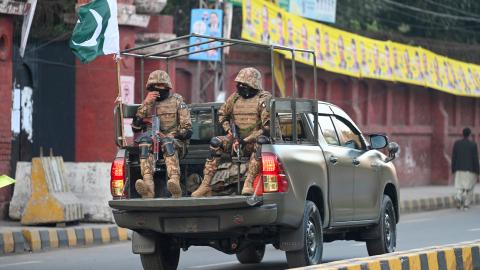Almost everyone who follows events in Pakistan now believes that the results of Pakistan’s elections scheduled for February 8 are pre-determined, as is the long-term outcome. Pakistan Muslim League (PML-N) is expected to emerge as the single largest party and its leader, Nawaz Sharif, is predicted to become prime minister for a fourth time.
Given the Pakistani military’s control over the country’s affairs, and its past tendency of toppling leaders it once supported, it is also being predicted that it is only a matter of time before a fallout between the next civilian prime minister and the generals occurs.
But these predictions are brd on Pakistan’s turbulent history and make little provision for altered circumstances. Imran Khan’s Pakistan Tehreek-e-Insaf (PTI) dominates social media, and mainstream media coverage is shaped by the revulsion among journalists for the highhandedness of Pakistan’s military establishment. PTI supporters on social media predict a revolution; mainstream media coverage assumes that the past will repeat itself. What if neither happens?
Imran Khan, once the army’s choice, has poisoned even traditional pro-army constituencies against Pakistan’s institution of last resort. The former cricketer and his supporters did so only after the army stopped supporting them. Otherwise, Khan and his supporters endorsed General Musharraf’s military coup, supported the military-backed ousting of past prime ministers, and took pride in being “on one page” with the military leadership until Khan’s ouster from the office of prime minister through a parliamentary vote of no confidence.
The new-found hostility of former military supporters towards the military has made it difficult for the generals to continue business as usual. It might just be possible that the military leadership might finally be prepared to tweak its political strategy. Instead of repeating the old cycle of elect-dismiss-disqualify-arrest, the army might this time be willing to put its weight behind the elected civilian leadership in what can best be described as Pakistan’s Bangladesh Formula.
This plan would entail allowing Nawaz Sharif and the Muslim League to govern with an iron hand, with full military backing, just as Sheikh Hasina and the Awami League have ruled Bangladesh since 2009. Khan’s PTI and other challengers would then be crushed just as the Bangladesh Nationalist Party (BNP) and its ally, Bangladesh Jamaat-e-Islami have been decapitated. For it to work, Nawaz Sharif would have to curb his impulses in asserting civilian supremacy or treading on the military’s chosen turf.
The focus of this new government of civil-military partnership would be to calm things down at home and restore the health of Pakistan’s economy. If the army approves, it could also mend fences with Pakistan’s neighbours, especially India. There would be periodic elections, with predictable results, and the usual condemnation from Western governments and human rights organisations over violations of human rights. But the expectation is that if economic gains are visible, dissent would be limited and so will international criticism.
Of course, Pakistan’s history offers little comfort that the February 8 election will help resolve deep-rooted political problems. The potential “new” formula inspired by Bangladesh’s success could easily get derailed and Pakistan’s failure in developing a workable political system might get prolonged. Pakistan’s track record on elections has hardly been positive. The country had no general elections from 1947 until 1970. When elections were finally held in 1970, civil war ensued. The results of the 10 elections since then have either been disputed by the loser or resulted in governments that were ousted through intrigue.
The Pakistan army sees itself as the ultimate guarantor of Pakistan’s unity and survival. It is unlikely to give up that role just because youthful supporters of Khan (whom the army considers its own political creature gone wrong) are shaming it on social media. The PTI’s social media warriors are not yet battle-hardened political insurgents. If their hopes of an election day upset for the establishment do not materialise, some of them might be tempted to repeat the violent tactics they deployed when Khan was first arrested last year on May 9.
Aggressive attacks on military installations only paved the way for a harsher crackdown on PTI. Some PTI supporters still claim that the May 9 violence was a “false flag operation”, orchestrated by the military to justify arresting hundreds of PTI activists. But after losing an election they are convinced they should win, Khan’s followers will have to either put up or shut up. They will have to turn out millions of people in the streets, protesting a “rigged election” or reconcile to its outcome.
Although Pakistan’s politics can take unexpected turns at any time, the chances that social media noise and a vocal younger generation’s frustrations will turn into a revolution appear slim at the moment. It is true that the PTI is facing the brunt of state repression and is, therefore, gaining sympathy. But the dynastic political parties that have been targets of similar repression in the past are far from decimated. Nawaz Sharif still manages to turn out large crowds in Punjab and Bilawal Bhutto’s Pakistan Peoples Party remains unchallenged in its Sindh stronghold.
Once the votes have been cast and counted, and the new government formed, we will find out whether familiar cycles from the past are about to be repeated. Or has a new script finally been written for Pakistan’s political theatre.















